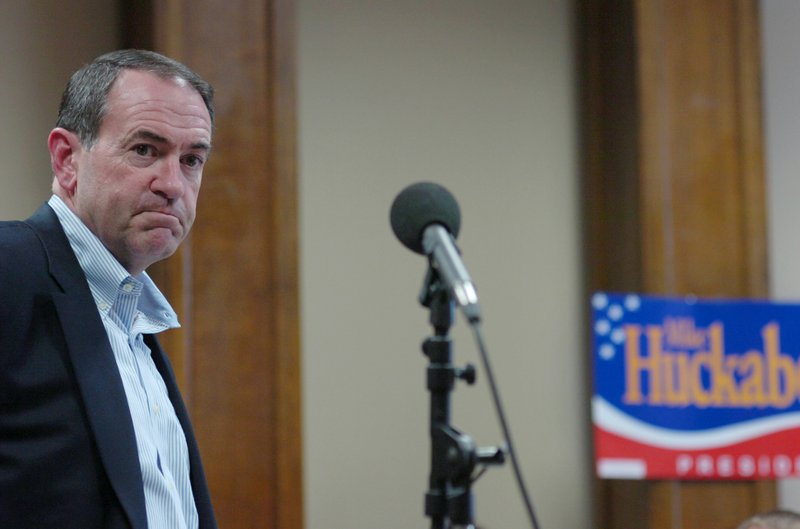DES MOINES, Iowa — Mike Huckabee, who strums a bass guitar and cracks jokes at campaign stops, is quietly establishing himself with Iowa voters as a serious candidate for the Republican presidential nomination.
"I think he's the sleeper candidate this year," said Steve Roberts, a Des Moines lawyer who sits on the Republican National Committee. "He makes a very positive impression in his public appearances and in the debates."
Huckabee's success thus far in this early voting state has raised the question: Can he overcome his rivals' advantages? He doesn't have the money of Mitt Romney, the celebrity of Rudy Giuliani or the personal history of John McCain.
But the former Arkansas governor has a message that resonates with many Iowans. He is an ordained Baptist minister whose opposition to abortion and gay rights appeals to social and religious conservatives, and he has a personal story of losing more than 100 pounds that has helped form his stand on health care.
Huckabee often delivers his conservative message while poking fun at himself and others - at times while performing with his rock band, Capitol Offense.
It's a combination that led him to a strong showing at the recent Values Voter summit in Washington where he tied with Romney in a straw poll and 12 percent in the latest survey by The Des Moines Register.
In August, Huckabee finished second to Romney in a high-profile Iowa GOP straw poll.
Still, Huckabee has been unable to attract the necessary cash for his campaign, and he is stuck in low single digits in national polls. Huckabee raised $2.3 million as of Sept. 30 and had $650,000 cash on hand. By comparison, Giuliani had $16.6 million cash on hand, Romney $9.2 million and Fred Thompson $7.1 million.
His lack of money means Huckabee can field only eight paid staff members in Iowa, about half the size of Romney's campaign, and cannot air TV ads as Romney has done for months.
Given the front-loaded election schedule, in which Iowa and New Hampshire will be followed by an explosion of primaries, many wonder if a candidate without a pile of money can afford to build the organizations needed to compete throughout the nation.
"I think it's a pretty big problem when you look at $600,000 in the bank and the compressed schedule," said Bob Haus, who works for Thompson. "This is not just an Iowa analysis any more. You have to be up and running in 10 or 12 states."
Huckabee rejects the notion that big money is essential.
"People have said you have to have this much money to be competitive and they've been wrong," he said. "A lot of these campaigns have spent an enormous amount of money. We have been frugal and make no apologies for that."
Given the organization Romney has built in Iowa, some think a second-place finish could be enough to give Huckabee the boost he needs. The Iowa caucuses have a history of lifting the campaigns not only of caucus victors, but second-place finishers as well.
In 1972, for example, George McGovern finished behind Edmund Muskie in the caucuses, but the strong showing propelled McGovern toward the Democratic nomination. In 1980, Ronald Reagan finished second to George H.W. Bush but claimed the GOP nomination. Bush eventually became Reagan's running mate.
"I really do think the battle in Iowa is for second place," said the state's Republican chairman, Richard Schwarm, a lawyer and Romney backer. "I think he's got a good shot at second place."
Steve Scheffler, who heads the Iowa Christian Alliance, said Huckabee has put himself in position to finish surprisingly well in Iowa's caucuses. The key will be whether Huckabee can build a campaign organization to take advantage of his appeal to socially conservative Iowans.
"I think it's fair to say that the two people who have gained the most traction with this constituency are Romney and Huckabee," Scheffler said. "If they understand the conservative Christian community, then they can pull a surprise here."
Huckabee and others note that his rise in the polls comes amid signs that Republicans have not settled on a candidate. All the top-tier contenders have weaknesses.
Romney has been criticized for dropping his support for abortion rights and gay rights as he tries to appeal to the GOP's conservative base. Giuliani has had to defend his support for abortion rights, gay rights and gun control.
McCain has advocated an immigration change that includes a pathway to citizenship for illegal aliens and co-wrote a campaign finance law not well-liked by conservatives.
Thompson has had trouble meeting the sky-high expectations that his entry would reshape the Republican presidential race.
Huckabee also has vulnerabilities that opponents are likely to raise as his prominence in the race grows. He has been criticized by anti-tax groups for signing tax increases as governor, although he also signed into law nearly $100 million in income tax breaks.
Two months after taking over as governor, Huckabee announced he would commute the sentence of castrated rapist Wayne DuMond, creating a furor. Four months later, Huckabee denied clemency on the same day that the state parole board announced it would release DuMond if another state accepted him. DuMond was released to Missouri in October 1999 and in June 2001, he was charged in the murder of a Kansas City-area woman.
The longer Iowa activists consider their options, the longer Huckabee has a chance to nudge his way into contention.
"There have been some major surprises in the past," said Ray Hoffmann, Iowa GOP chairman. "If he does second or third here and then second or third in New Hampshire, people are going to have to take another look."

